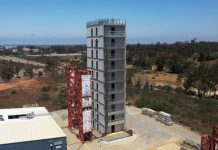
Just about everyone has had the experience of blinking while having their picture taken.
The camera clicks, your eyes shut, and by the time they open again, the photo is ruined.
A new ultrafast camera developed at Caltech, were it aimed at your lovely face, could also capture you looking like a dunce with your eyes shut, except instead of taking just one picture in the time it takes you to blink, it could take trillions of pictures.
The new camera developed in the lab of Lihong Wang, Bren Professor of Medical Engineering and Electrical Engineering in the Andrew and Peggy Cherng Department of Medical Engineering, is capable of taking as many as 70 trillion frames per second.
That is fast enough to see waves of light traveling and the fluorescent decay of molecules.
The camera technology, which Wang calls compressed ultrafast spectral photography (CUSP), is similar in some respects to previous fast cameras he has built, such as his phase-sensitive compressed ultrafast photography, or pCUP, device, which can take 1 trillion frames per second of transparent objects and phenomena.
CUSP combines a laser that emits extremely short pulses of laser light that last only one quadrillionth of a second (one femtosecond) with optics and a specialized type of camera.
The optics break up individual femtosecond pulses of laser light into a train of even shorter pulses, with each of those pulses capable of producing an image in the camera.
Wang says the technology could open up new avenues of research in fields that include fundamental physics, next-generation semiconductor miniaturization, and the life sciences.
“We envision applications in a rich variety of extremely fast phenomena, such as ultrashort light propagation, wave propagation, nuclear fusion, photon transport in clouds and biological tissues, and fluorescent decay of biomolecules, among other things,” Wang says.
A paper describing the technology, titled, “Single-shot ultrafast imaging attaining 70 trillion frames per second,” appears in the April 29 issue of Nature Communications. Wang’s co-authors include Peng Wang, postdoctoral scholar in medical engineering, and Jinyang Liang, formerly of Caltech and now at the National Institute of Scientific Research in Quebec.
Funding for the research was provided in part by the National Institutes of Health. Wang is also affiliated with the Tianqiao and Chrissy Chen Institute for Neuroscience at Caltech.
Written by Emily Velasco.



